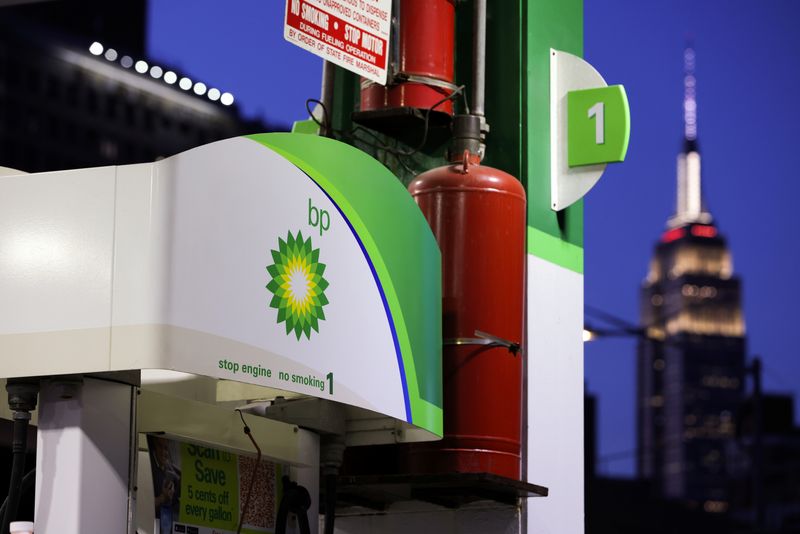By Ron Bousso
LONDON (Reuters) - BP (NYSE:BP)'s profits hit their highest in eight years in 2021, lifted by soaring gas and oil prices, as the company boosted share repurchases and accelerated plans to cut emissions with increased spending on low carbon energy.
BP's rebound to an annual profit of $12.85 billion after a large loss in 2020, is likely to add to calls in Britain for higher taxes on energy producers to help reduce consumers' energy bills.
The results were supported by higher oil and gas prices and production, partly offset by weaker oil trading results and the impact of higher energy costs on operations such as refining, the company said.
Natural gas and electricity prices around the world have soared since the middle of last year because of tight gas supplies and higher demand as economies rebounded from pandemic shutdowns.
BP said it would plough more cash into its low-carbon and renewables business while reducing oil output in order to cut greenhouse gas emissions to net zero by mid-century.
But as companies like BP reduce spending on new fossil fuel projects, consumers should expect more volatile oil and gas prices, Chief Executive Bernard Looney said.
"We can expect more volatility in the coming months and years," Looney told Reuters.
In the fourth quarter of 2021, BP's underlying replacement cost profit, its definition of net earnings, reached $4.1 billion, beating analysts' forecast of $3.93 billion.
That was BP's largest quarterly profit since early 2013.
BP shares were up 0.3% at 1446 GMT, compared with a 0.1% decline in the broader European energy index.
For the year, BP's $12.85 billion profit compared with a loss of $5.7 billion in 2020, when it wrote off $6.5 billion from the value of its oil and gas assets following a slump in energy demand.
BP's debt fell to $30.6 billion by the end of last year, down $8.3 billion from a year earlier.
The company maintained its dividend at 5.46 cents per share and boosted its share repurchase targets to $1.5 billion per quarter from $1.25 billion.
Capital spending will grow in 2022 to a range of $14 billion to $15 billion, up from $12.8 billion in 2021.
Last week, Shell (LON:RDSa) boosted its share buybacks and dividend after fourth-quarter profits hit their highest in eight years, helped by a strong gas trading performance.
LOW-CARBON SPENDING
Looney laid out plans in 2020 to cut BP's carbon emissions in the coming decades by increasing its renewable power capacity 20-fold by 2030 and reducing its oil output by 40%, or more than 1 million barrels per day.
While maintaining its plan to spend $14-$16 billion per year until 2025, in its strategy update on Tuesday BP said it would increase spending on low carbon energy, which includes retail and electric vehicle charging, to 40% of total spending by 2025 and 50% by 2030.
These businesses are expected to generate earnings of $9-$10 billion by 2030, BP said, seeking to assuage investor concerns over the returns of low carbon businesses in the long term.
"We're not investing for growth" in oil and gas production, Looney told analysts, even as BP expects fossil fuels to deliver $33 billion in annual earnings until 2025.
BP also accelerated its carbon emissions reduction plans, now aiming to cut to net zero all greenhouse gas emissions from its operations, production and sales by 2050, catching up with rivals including Shell and Norway's Equinor.

The new decarbonisation targets double the carbon emissions BP will need to cut or offset to 2 billion tonnes, Looney said.
Tobias Wagner, senior credit officer at Moody’s, said that while the results were strong and the company provided more details on its strategy "the transition will also take time and carries execution risks, with hydrocarbon operations to continue to remain the largest profit contributor for some time."